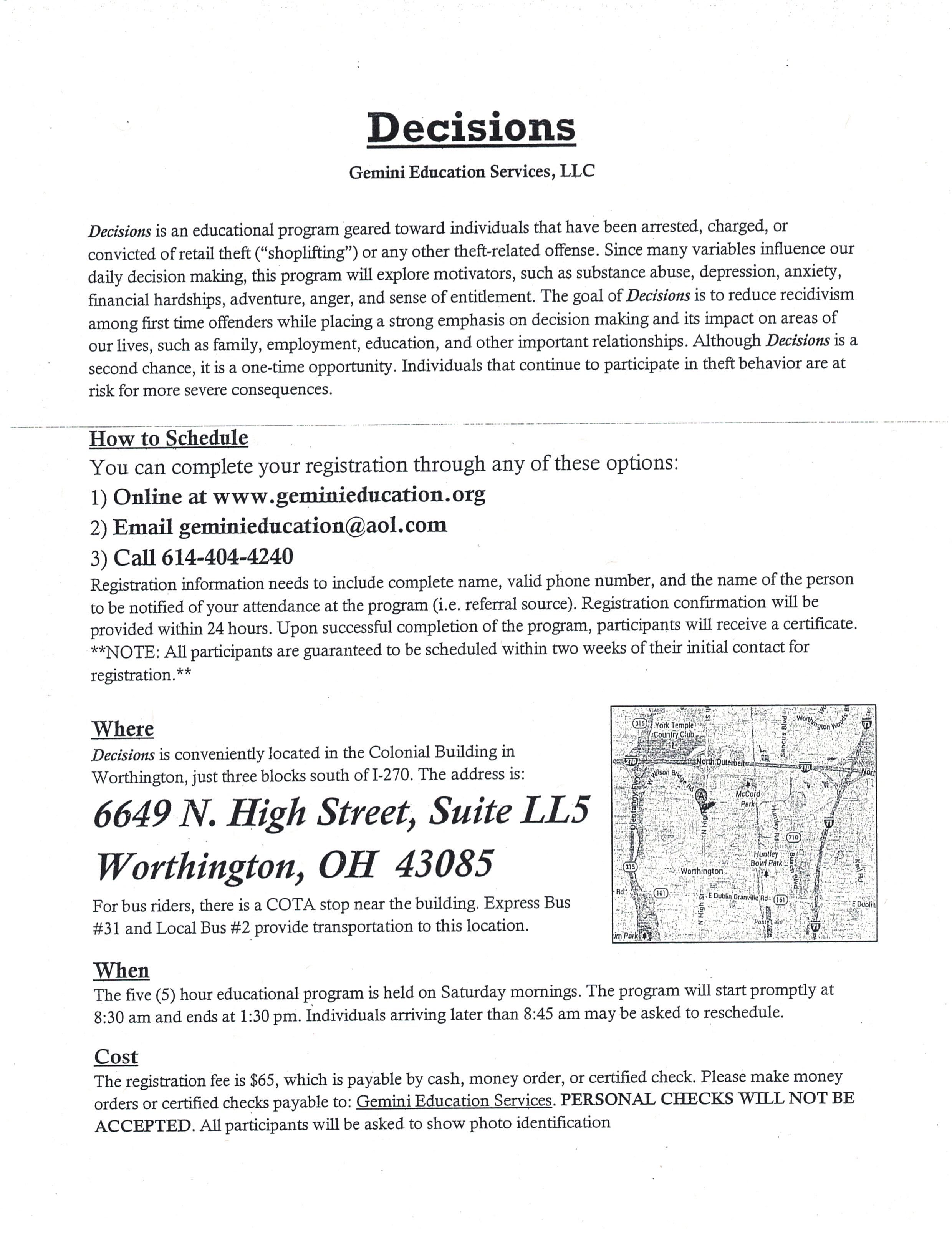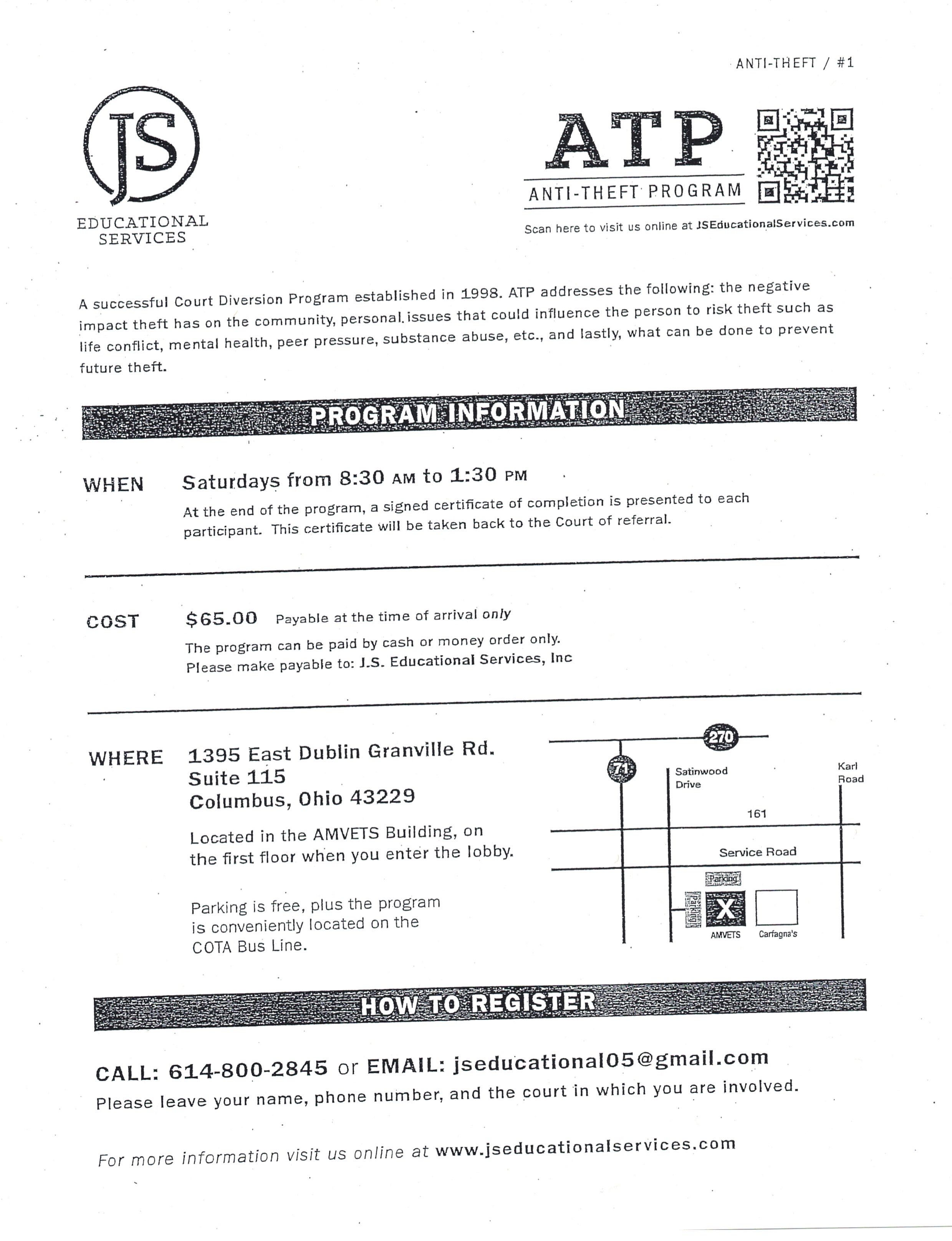Many courts in Ohio offer diversion programs to allow for individuals to avoid certain types of convictions for appearing on one’s criminal record. A diversion program is usually an agreement between a prosecutor and a first-time offender, where the offender agrees to undergo a pre trial supervision period through the court and complete certain requirements determined by the prosecutor.
Completion of the requirements of the diversion program results in the dismissal of the petty theft case against you, and allows for one’s criminal record to remain free of a damaging petty theft conviction. Not all courts have a theft diversion program or do not advertise its existence. An experienced attorney can guide you through the process of entering into a diversion program.
Similar to diversion programs, a prosecutor may offer to dismiss a petty theft case if the defendant agrees to participate in and complete an anti-theft class. Usually not as intensive as a diversion program, these classes are reserved for cases where the amount alleged to have been taken is not valued at a large amount.
Not all prosecutors offer to dismiss cases upon completion of a class, and not all classes are accepted as part of the deal. Experienced attorney’s know which classes a prosecutor will accept, and which courts allow for an anti-theft class to be completed in exchange for a dismissal of the charged.
Someone can be charged with complicity to commit a petty theft offense where an individual is charged with committing a petty theft offense, and police argue that you:
- Solicited another to commit a petty theft offense
- Aided or abetted someone who committed a petty theft offense
- Conspired with another to commit a theft offense
Under Ohio Revised Code 2923.03, one cannot be guilty of conspiracy to commit petty theft unless the act actually occurs. And one cannot be guilty of complicity to commit a petty theft offense so long as before a theft offense occurs, you have made it clear that you no longer with to participate in the criminal activity.
A defendant was found to be guilty of complicity to commit a petty theft offense when he drove away from a department store with an individual who was suspected of shoplifting multiple items. Though evidence did not show he participated in shoplifting in any way, he was still found guilty because it could be shown he aided the individual in leaving the scene. State v. Flachbart, 2009 Ohio 5063.
Courts in Ohio have held that leaving a store with merchandise by accident is a defense since it cannot be shown that someone acted with purpose to deprive the store of merchandise as stated under Ohio Revised Code 2913.02.
A defendant had his petty theft conviction overturned on appeal when the defendant placed two bolts in his shirt pocket while he was shopping in a store. After deciding not to purchase another item, the defendant left the store without paying for the bolts. State v. Castellano, 1994 WL 446955.
A court date will be set where you will have the option of pleading guilty, not guilty, or no contest. Since petty theft offenses can carry stiff penalties, and the possibility of avoiding a theft conviction exists in many scenarios, it is recommended to plead “not guilty” at the first court appearance. An experienced attorney can guide you through the initial steps to ensure the best possible outcome.
Yes – theft convictions are expungeable in Ohio.
A theft offense on a criminal record can have many negative impacts including future employment opportunities, applying to further one’s education, and the ability to pass a background check.
In order to begin the process of expungement process for a petty theft offense, you must be an eligible offender and only have five or less criminal offenses on their record. Any combination of misdemeanors and felonies are eligible to apply for expungement.
Anyone convicted of a petty theft offense must wait one year from the conclusion of the case before applying for expungement, but if the case was dismissed, through diversion or an anti-theft class, the record will eligible for immediate expungement.
If you have been charged with theft in Columbus, a Columbus theft attorney can help answer your questions and fight your case.
Depending on the case, penalties for a theft conviction in Columbus could include:
- Fines and court costs
- Jail time
- Probation
- Restitution
- Participation an anti-theft class or other counseling
- Difficulty obtaining employment, particularly in the retail and financial sectors
- Trouble securing a professional license
- Potential implications for custody
- Potential implications for obtaining a loan or other credit
Under both the Columbus and Ohio theft laws, theft is a first degree misdemeanor under which you could face up to a $1000 fine and up to 180 days in jail.
If you choose Riddell Law as your Columbus theft attorneys, we will carefully investigate all of the facts in your case, including the available evidence, statements from witnesses and video footage. We will then work to build a theft defense strategy that offers you the best chance for the best outcome, including limiting the consequences of a conviction to you both personally and professionally.
Our strategy will include investigating whether you are eligible for a diversion program, which could include the possibility of expungement of your theft or shoplifting charges, dismissal or sealing of the record so that the charge would not appear on background checks by future employers.
Whether you opt to negotiate a plea agreement, or want to fight your charges in the Franklin County Municipal Court, one of the Mayor’s Courts around Columbus, or other county municipal court, we will work diligently to help you find the most favorable resolution possible.
We are transparent about our flat fee structure for your Ohio theft or shoplifting charge and will upfront in our first meeting with you about any and all legal fees. Additionally, we accept all major credit cards and can discuss financing options with qualifying clients.
Contact us today for a free case review to discuss your options.
Contact us via email at doug@riddelllaw.com, call us at (614) 361-2804 or fill out the confidential contact form to the right.





